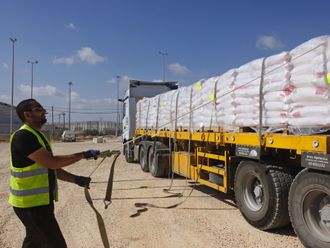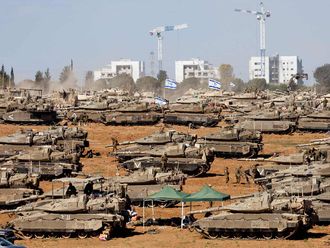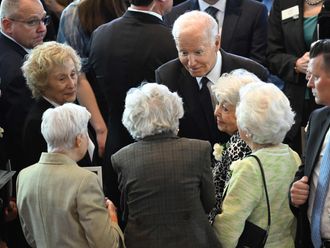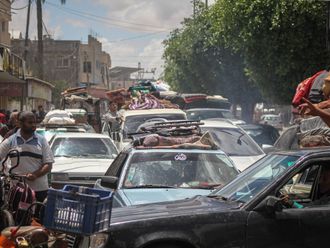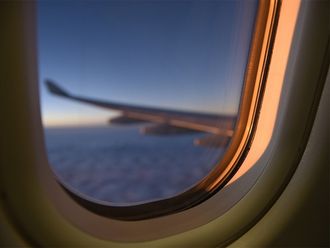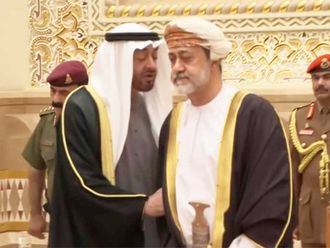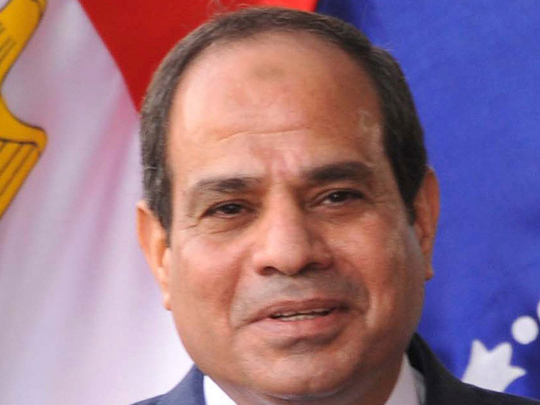
Cairo: By targeting Daesh with air strikes in Libya, Egypt’s President Abdul Fattah Al Sissi, having crushed Islamist opponents at home, has become a key ally of the West against militants, experts say.
His warplanes bombed Daesh camps and weapons stores in the Libyan city of Derna hours after the extremists released a gruesome video showing masked militants beheading 21 Egyptian Christians on a Libyan beach.
The raids were the first time Egypt has announced military action against Daesh targets in its western neighbour, having previously denied it targeted militants there.
Egypt had steered clear of a direct fight with Daesh outside the country, but there have been reports it’s been covertly engaged. Al Sissi has regularly said Cairo is fighting its own “war on terrorism”, in the restive Sinai Peninsula, where an Islamist insurgency has killed scores of policemen and soldiers.
Officials blame the blacklisted Muslim Brotherhood of former president Mohammad Mursi, who was ousted by then army chief Al Sissi in July 2013, for deadly attacks in the country.
These attacks have been claimed by militant groups such as Daesh-linked Ansar Beit Al Maqdis.
The Brotherhood has been a target of a brutal crackdown overseen by Al Sissi since Mursi’s ouster.
More than 1,400 people, mostly Mursi supporters, have been killed, thousands imprisoned and hundreds sentenced to death after speedy trials which the United Nations says are “unprecedented in recent history”.
Global rights groups have condemned the crackdown against the Brotherhood, which made strong electoral gains after the 2011 revolution that ousted longtime autocrat Hosni Mubarak.
Weeks after police raided two pro-Mursi protest camps in Cairo on August 14, 2013 at the cost of hundreds of lives, Washington suspended its annual $1.5 billion (Dh5.51 billion) military aid to Cairo, citing human rights concerns.
It warmed up to Cairo only in recent months by unfreezing the aid, and it offered Apache helicopters to the Egyptian army to fight militants in Sinai.
Bombing Daesh targets in Libya will now show Al Sissi’s resolve to counter a wider Islamist threat in the region, said H.A. Hellyer, Arab affairs expert at Washington-based Brookings Institute.
“In this case, he probably sees the Egyptian action as comparable to the Jordanian military retaliation after the killing of their pilot,” said Hellyer.
Jordan, a member of the US-led coalition fighting Daesh in Iraq and Syria where the group has captured swathes of territory, escalated its air campaign after the militants claimed the murder of a Jordanian pilot captured in Syria in December.
A gruesome video released this month by Daesh showed militants burning pilot Muath Al Kassaesbeh alive in a metal cage.
“With strikes in Libya, Al Sissi’s stature will definitely rise in the West and also at home”, where he already enjoys popularity, said Mustapha Kamel Al Sayyid, a Cairo University political professor.
“Although he has been building new allies by speaking to Russia, China and France, the Libyan operation will also help lift the rest of US sanctions imposed on Egypt when the military aid was frozen.”
On Monday, Egypt signed a 5.2 billion euro ($5.9 billion) deal to purchase 24 French Rafale warplanes — a show of support for Al Sissi who wants to break a US monopoly over Egypt’s arms supplies.
Hellyer said air raids in Libya would silence some critics of Al Sissi’s government.
“There remain those critical of Egypt due to human rights concerns and curbing of civil liberties, but against the backdrop of Daesh, that’s likely to take a back seat,” he said.


